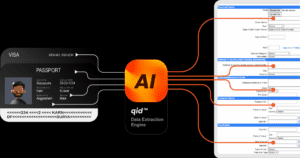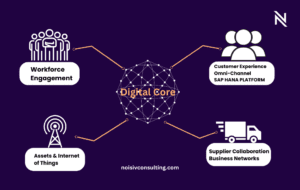Quantum Computing: Unlocking the Power of the Quantum Realm
In the world of modern computing, a new frontier is emerging, one that promises to revolutionize the way we solve complex problems, encrypt sensitive information, and simulate the behaviour of molecules and materials. This frontier is quantum computing, a field that blends the rules of quantum mechanics with the principles of computer science to create machines that operate on a fundamentally different level than classical computers. In this comprehensive guide, we will delve deep into the fascinating world of quantum computing, exploring its foundations, applications, challenges, and the potential it holds for the future.
Download:-India’s 1st ID Gateway – qid
Quantum Mechanics and the Birth of Quantum Computing
Understanding Quantum Mechanics
To comprehend quantum computing, we must first grasp the enigmatic principles of quantum mechanics:
- Superposition: At the quantum level, particles like electrons can exist in multiple states simultaneously. While classical bits in conventional computers can be either 0 or 1, quantum bits or qubits can represent both 0 and 1 at the same time. This unique property forms the foundation of quantum computing, enabling it to explore numerous possibilities simultaneously.
- Entanglement: Quantum entanglement is a phenomenon where the properties of two or more particles become correlated in such a way that the state of one particle instantaneously affects the state of the others, even if they are separated by vast distances. This seemingly paradoxical connection plays a crucial role in quantum computing.
- Quantum Tunneling: Particles at the quantum level can “tunnel” through energy barriers that classical physics would deem insurmountable. This property allows quantum computers to explore solution spaces more efficiently.
Birth of Quantum Computing
The idea of quantum computing was conceived by physicist Richard Feynman in the early 1980s. He recognized that simulating quantum systems, which classical computers struggled with, could be done far more efficiently using machines that harnessed the inherent quantum properties of matter and energy.
In 1982, physicist David Deutsch laid the theoretical foundation for quantum computing, proposing a quantum Turing machine that could perform computations more efficiently than classical counterparts.
Quantum Bits and Quantum Computers
Quantum Bits (Qubits)
At the heart of quantum computing are qubits, the quantum analogue of classical bits. While classical bits can only be in one of two states (0 or 1), qubits can exist in a superposition of both 0 and 1 states simultaneously. This property allows quantum computers to process vast amounts of information in parallel.
Qubits can be realized using various physical systems, including:
- Trapped Ions: Electrically charged atoms (ions) can be trapped and manipulated using electromagnetic fields to serve as qubits.
- Superconducting Circuits: Tiny circuits made from superconducting materials, when cooled to extremely low temperatures, can maintain quantum states as qubits.
- Photons: Quantum bits can also be represented by particles of light, known as photons, and are crucial for quantum communication.
- Topological Qubits: Theoretical qubits based on exotic particles called anyons, which are highly resilient to errors.
Quantum Computers in Action
Quantum computers are designed to solve problems that are practically unsolvable by classical computers due to their sheer complexity. Some notable applications include:
- Factorization: Shor’s algorithm, a quantum algorithm, can factor large numbers exponentially faster than classical algorithms. This has significant implications for cryptography, potentially rendering many encryption methods obsolete.
- Optimization: Quantum computers excel in solving optimization problems, which are ubiquitous in logistics, finance, and materials science. They can rapidly find the best solution from a vast solution space.
- Drug Discovery: Quantum computers can simulate molecular interactions with unparalleled precision, accelerating drug discovery by identifying potential drug candidates and their interactions with biological systems.
- Machine Learning: Quantum machine learning algorithms have the potential to enhance pattern recognition, classification, and data analysis tasks, opening up new frontiers in artificial intelligence.
- Quantum Simulation: Quantum computers can simulate complex quantum systems, enabling breakthroughs in quantum chemistry, materials science, and understanding fundamental physical phenomena.
Challenges and Future of Quantum Computing
Overcoming Errors and Decoherence
Quantum computers are exquisitely sensitive to errors caused by environmental factors like temperature fluctuations and electromagnetic radiation. The inherent fragility of qubits makes error correction a paramount challenge in quantum computing. Developing quantum error correction codes, which require a substantial overhead of qubits and operations, is crucial for making quantum computers practical.
Additionally, decoherence, the loss of quantum coherence due to interactions with the environment, poses a significant hurdle. Mitigating decoherence is essential for maintaining the superposition and entanglement necessary for quantum computations.
Building Scalable Quantum Hardware
Scaling up quantum computers to a size where they can handle complex real-world problems is a monumental engineering feat. This includes building quantum processors with a larger number of qubits and improved connectivity, as well as developing quantum memories and communication channels.
Quantum Algorithms and Software
While quantum algorithms have shown promise, many are still in their infancy, and their practical implementation requires sophisticated quantum software development. Bridging the gap between quantum algorithms and real-world applications is an ongoing challenge.
Quantum Cryptography and Security
Quantum computing poses a dual threat to cryptography. On one hand, it can break existing classical encryption methods. On the other hand, it offers the potential for quantum-safe encryption methods, known as post-quantum cryptography. Research in this area is crucial to ensure the security of data in the quantum era.
Conclusion: The Quantum Leap Ahead
Quantum computing represents a remarkable leap forward in our quest for computational power. It harnesses the mysterious properties of the quantum realm to tackle problems previously thought unsolvable. As we overcome the challenges of errors, scalability, and algorithm development, quantum computing has the potential to revolutionize industries, from finance to healthcare, and unlock new frontiers in scientific discovery. The quantum leap ahead is not just an evolution; it’s a paradigm shift that promises to reshape the world of computing and our understanding of the universe itself. The journey into the quantum frontier has only just begun, and the possibilities are boundless.








